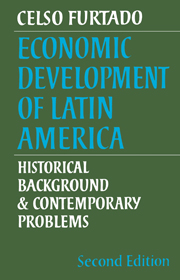Book contents
- Frontmatter
- Contents
- Tables
- Preface to the second edition
- Preface to the first edition
- Abbreviations
- Maps
- PART ONE FROM THE CONQUEST TO THE FORMATION OF NATION-STATES
- PART TWO ENTRY INTO THE SYSTEM OF INTERNATIONAL DIVISION OF LABOUR
- PART THREE THE TRADITIONAL STRUCTURAL PATTERN
- PART FOUR CHARACTERISTICS OF THE INDUSTRIALISATION PROCESS
- PART FIVE REORIENTATION OF DEVELOPMENT IN THE RECENT PERIOD
- PART SIX INTERNATIONAL RELATIONS
- 17 Traditional forms of external dependence
- 18 New forms of external dependence
- 19 Towards the restructuring of the international economy
- PART SEVEN INTRA-REGIONAL RELATIONS
- PART EIGHT STRUCTURAL RECONSTRUCTION POLICIES
- Bibliography
- Index
18 - New forms of external dependence
Published online by Cambridge University Press: 25 January 2010
- Frontmatter
- Contents
- Tables
- Preface to the second edition
- Preface to the first edition
- Abbreviations
- Maps
- PART ONE FROM THE CONQUEST TO THE FORMATION OF NATION-STATES
- PART TWO ENTRY INTO THE SYSTEM OF INTERNATIONAL DIVISION OF LABOUR
- PART THREE THE TRADITIONAL STRUCTURAL PATTERN
- PART FOUR CHARACTERISTICS OF THE INDUSTRIALISATION PROCESS
- PART FIVE REORIENTATION OF DEVELOPMENT IN THE RECENT PERIOD
- PART SIX INTERNATIONAL RELATIONS
- 17 Traditional forms of external dependence
- 18 New forms of external dependence
- 19 Towards the restructuring of the international economy
- PART SEVEN INTRA-REGIONAL RELATIONS
- PART EIGHT STRUCTURAL RECONSTRUCTION POLICIES
- Bibliography
- Index
Summary
Financial flows
After the Second World War there was a marked change in the evolution of mechanisms for international financial co-operation. During the two decades following the 1929 crisis the amount of foreign investment in Latin America had declined. The capital markets of Europe and the United States had been closed to bonds issued by public or private entities in the region and the bitter experience of the 1930s had made it only too clear that, given the instability of the foreign exchange earnings of countries exporting primary products, the accumulation of a large external debt ruled out any possibility of carrying out rational economic policies in these countries. On the other hand, in the two decades referred to, the development of the region's economies had been financed, in the case of the region's most industrially advanced countries, mostly out of domestic savings. Moreover, a large part of the foreign debt accumulated in the preceding period had been repaid, thanks to the favourable balance of trade of the war years. Besides, the traumatic experiences resulting from the conflicts between foreign-owned enterprises and some of the region's national governments - the expropriation of Mexican oil was only the most spectacular instance - had created a climate that made it difficult to take an objective view of the problems of international financial co-operation.
Two trends emerged in the immediate post-war years. The first was the delimitation of areas closed to the operations of foreign-owned enterprises.
- Type
- Chapter
- Information
- Economic Development of Latin AmericaHistorical Background and Contemporary Problems, pp. 194 - 208Publisher: Cambridge University PressPrint publication year: 1977



